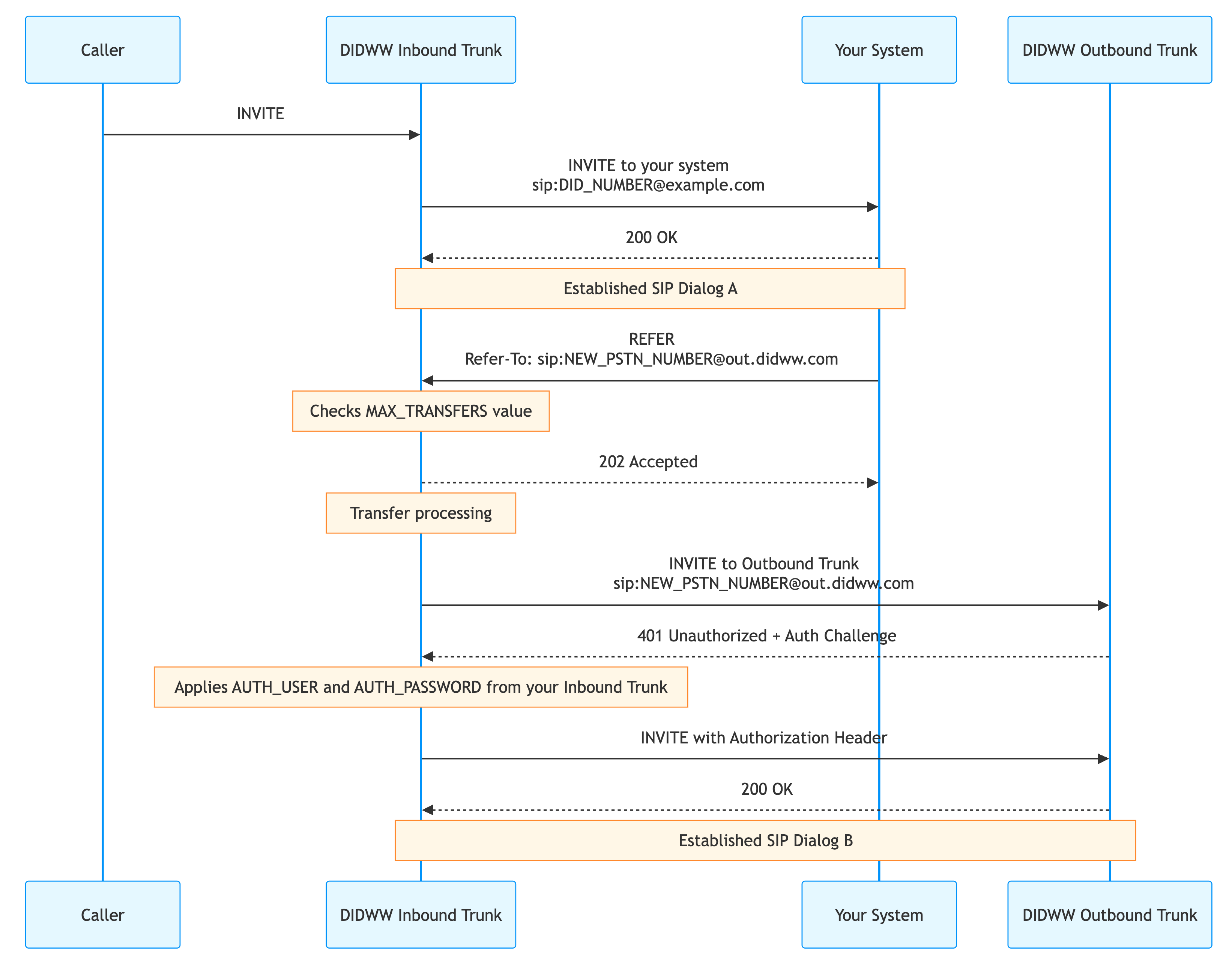Inbound Call Redirection Methods
Inbound calls can be redirected to an external phone number (PSTN) through your account’s Outbound Trunks. Advanced routing is achieved by responding to an incoming call with either a 30x Redirect SIP response or an in-dialog REFER request.
Before You Begin
At least one Outbound Trunk is required, with Authentication method set to Credentials & IP-Based, and DIDWW SIP/RTP IP addresses allowed.
An Inbound SIP Trunk is required, with Max 30x Redirects or Max Transfers set to a value greater than 0 (configured in Advanced Signaling Settings).
Authentication is required on the Inbound SIP Trunk, using the same Auth User and Auth Password configured on the chosen Outbound Trunk.
The SIP destination URI is required in the format
sip:NEW_PSTN_NUMBER@<outbound_endpoint>and included in the Contact header for 30x responses or the Refer-To header for REFER requests.
Note
The full list of outbound endpoints is available at Signaling Endpoints.
NEW_PSTN_NUMBERis the E.164 phone number, and<outbound_endpoint>is a DIDWW outbound endpoint (e.g.,out.didww.com).
30x Redirect Method
This method redirects an inbound call to a new destination without answering it.
Your system replies to the DIDWW INVITE with a SIP
302 Moved Temporarily(or another 3xx response), including the new destination in theContactheader.DIDWW then starts a new outbound call to that SIP URI using your Outbound Trunk, authenticated with the credentials set on your Inbound Trunk.
Examples
302 SIP Response
Example of a valid 302 Moved Temporarily response:
SIP/2.0 302 Moved Temporarily
Via: SIP/2.0/UDP 192.0.2.5:5060;branch=z9hG4bK-393929
From: <sip:CALLER_NUMBER@46.19.209.14>;tag=123456
To: <sip:DID_NUMBER@example.com>;tag=abcdef
Call-ID: 01-01-35531111-68BE960300095714-69CF836B
CSeq: 1 INVITE
Contact: <sip:NEW_PSTN_NUMBER@out.didww.com>
Content-Length: 0
For more details, see RFC 3261 Section 21.3 .
Call Flow Diagram
%%{init: { "theme": "base", "themeVariables": { "actorBkg": "#e6f7ff", "actorBorder": "#1890ff", "noteBkgColor": "#fff7e6", "noteBorderColor": "#fa8c16" }}}%%
sequenceDiagram
participant caller as Caller
participant voice_in as DIDWW Inbound Trunk
participant pbx as Your System
participant voice_out as DIDWW Outbound Trunk
caller->>voice_in: INVITE
voice_in->>pbx: INVITE to your system<br/>sip:DID_NUMBER@example.com
pbx-->>voice_in: 302 Redirect<br/>Contact: sip:NEW_PSTN_NUMBER@out.didww.com
Note over voice_in: Redirect processing<br/>checks MAX_30x_REDIRECTS value
voice_in->>voice_out: INVITE to your Outbound Trunk<br/>sip:NEW_PSTN_NUMBER@out.didww.com
voice_out-->>voice_in: 401 Unauthorized + Auth Challenge
Note over voice_in: Applies AUTH_USER and AUTH_PASSWORD from your Inbound Trunk
voice_in->>voice_out: INVITE with Auth Header<br/>sip:NEW_PSTN_NUMBER@out.didww.com
voice_out-->>voice_in: 200 OK
Note over voice_in, voice_out: Call is established via Outbound Trunk
Use Cases
This method is ideal when a routing decision can be made immediately, without answering the call first.
Forward calls after hours to a service or mobile phone
Instantly route VIP callers to a direct line
Redirect desk calls to a mobile phone with follow-me rules
REFER Transfer Method
This method transfers an inbound call to a new destination after it has been answered.
Your system first answers the inbound call, creating an active SIP dialog.
When a transfer is needed, your system sends an in-dialog SIP
REFERrequest with the new destination in theRefer-Toheader.DIDWW validates the request against the
MAX_TRANSFERSsetting and replies with200 OK.Your system then sends a
BYEto close the original call leg. DIDWW initiates a new outbound call via your Outbound Trunk, authenticated with the credentials from your Inbound Trunk.
Examples
SIP REFER Request
Example of a valid in-dialog REFER request:
REFER sip:CALLER_NUMBER@46.19.209.14 SIP/2.0
Via: SIP/2.0/UDP 192.0.2.5:5060;branch=z9hG4bK-443322
Max-Forwards: 70
From: <sip:USERPART@example.com>;tag=abcdef
To: <sip:CALLER_NUMBER@46.19.209.14>;tag=123456
Call-ID: 01-01-35531111-68BE960300095714-69CF836C
CSeq: 2 REFER
Refer-To: <sip:NEW_PSTN_NUMBER@out.didww.com>
Referred-By: <sip:DID_NUMBER@example.com>
Contact: <sip:DID_NUMBER@192.0.2.5:5060>
Content-Length: 0
For more details, see RFC 3515 .
Use Cases
This method is useful when the call must first be answered before deciding where to route it:
Transfer calls after IVR menu selection (e.g., “Press 1 for Sales”)
Redirect from an AI voicebot to a live agent after intent detection
Forward calls from an agent’s softphone to an external specialist on the PSTN
Additional Resources
Step-by-step guide on configuring inbound and outbound SIP trunks in DIDWW to enable call transfers using SIP 30x Redirect or SIP REFER signaling.
